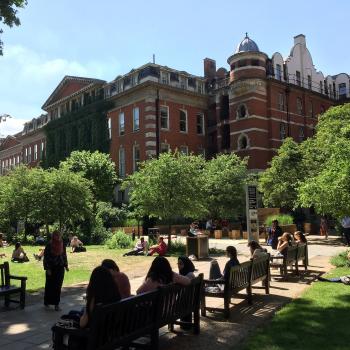
Elisabeth Kübler-Ross (1926-2004) was a Swiss-American physician and psychiatrist and the author of, among several other things, the pioneering 1969 book On Death and Dying. Dr. Kübler-Ross was very well-known and quite influential during her lifetime — not so much for her views on life after death as for her study of the dying process, which led to revolutionary rethinking in the health care professions about how to treat terminally ill patients. But, as a collateral result of her research — if she was conventionally Christian or even religious, I’m unaware of it — she came to believe strongly in the continuation of personal, conscious life beyond the grave. In fact, based on her work with literally thousands of dying patients, she said that she knew. She didn’t merely believe.
Here are some passages from a small posthumous collection of her talks, published as Elisabeth Kübler-Ross, On Life after Death (Berkeley and Toronto: Celestial Arts, 2008):
Do you understand what I’m trying to say? If someone doesn’t like a certain truth, he will come up with a thousand arguments against it. However . . . this is his problem. When they die, they will know it anyway. (7-8)
I probably disagree with some of her interpretations here, but she was reflecting on a vast amount of experience with people who were at death’s door:
There is proof that every human being, from his birth until his death, is guided by a spirit entity. Everyone has such a spirit guide, whether you believe it or not. . . . They are the ones who my little children call “playmates.” They talk to them and they are fully aware of their presence. But about the time they have to go to school, parents tell them: “You are now a big boy. You go to school. One doesn’t play such childish games anymore.” In this way you forget that you have spirit playmates until you are lying on your deathbed. A dying lady conveys to me: “Here he is again.” Since I do not know what she is referring to, I ask this lady if she could share with me what she has just seen. She tells me: “You must know, when I was a little kid he used to always be around me. But I have totally forgotten that he existed.” A day later she dies, full of joy, knowing that someone who loves her dearly is waiting for her.
In general, the people who are waiting for us on the other side are the ones who loved us the most. You always meet those people first. In cases of very small children — two or three year olds for example — whose grandparents and parents as well as all the other known family members are still on earth, it is mainly their personal guardian angel who receives them, or Jesus, or another religious figure. I never encountered a Protestant child who saw the Virgin Mary in his last minutes, yet she was perceived by many Catholic children. It is not a matter of discrimination, you are simply received by those who meant the most to you. . . .
[A]fter you have perceived that your body is whole again and you have encountered your loved ones, you will realize that dying is only a transition to a different form of life. (9-10)
Here, she’s obviously talking about what many students of near-death experiences have called the “life review,” which is commonly reported by those who return:
[Y]ou will come to know that all your life on earth was nothing but a school that you had to go through in order to pass certain tests and learn special lessons. (11)
You are now in possession of knowledge. You know in minute detail every thought you had at any time during your life on earth. You will remember every deed, and know every word that you ever spoke. This recapitulation is only a very small part of your knowing because at this moment you know all consequences resulting from your thoughts, and from every one of your words and deeds. (12)
In my classroom, a certain Mrs. Schwarz gave us our first account of a patient who had an out of body experience. This led to a collection of cases from all over the world. We have hundreds of cases, from Australia to California. They all share the same common denominator. They are all fully aware of shedding their physical body, and death, as we understand it in scientific language, does not really exist. Death is simply a shedding of the physical body like the butterfly shedding its cocoon. It is a transition to a higher state of consciousness where you continue to perceive, to understand, to laugh, and to be able to grow. The only thing you lose is something that you don’t need anymore: your physical body. It’s like putting away your winter coat when spring comes. You know that the coat is shabby and you don’t want to wear it anymore. That’s virtually what death is all about.
Not one of the patients who has had an out-of-body experience was ever again afraid to die. Not one them, in all our cases. Many of our patients also said that besides the feeling of peace and equanimity they have, and the knowledge that they can perceive but not be perceived, they also have a sense of wholeness. This means that somebody who was hit by a car and had a leg amputated, sees his amputated leg on the highway. But when he gets out of his physical body, he has both legs. One of our female patients was blinded in a laboratory explosion, and the moment she was out of her physical body she was able to see, was able to describe the whole accident and describe people who dashed into the laboratory. When she was brought back to life she was totally blind again. This may help you to understand why many, many of these patients resent attempts to artificially bring them back when they are in a far more beautiful, more perfect place. (26-27)












